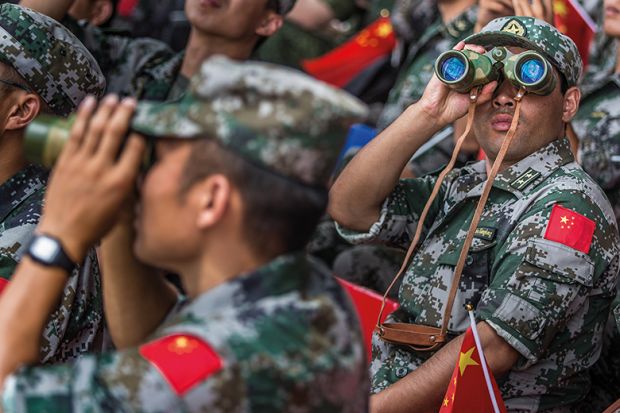US research universities are adopting a more watchful stance towards China as they finally fall in behind warnings from national security officials.
New steps being taken by institutions include:
- investigating which of their researchers are involved in China’s Thousand Talents initiative – aimed at luring Chinese scientists back home – and suggesting that they quit the programme
- calling on the government to consider putting technology company Huawei on a restricted list, so that universities no longer have to make their own assessments about the firm
- limiting campus visits by Chinese and other foreign visitors.
FBI agents have long met with university officials to warn them about China-related security threats, often to mixed receptions. At the conference of the Association of Public and Land-grant Universities (APLU) last November, an FBI presentation generated repeated complaints that the agency did not seem to appreciate the open nature of university research.
The tone was notably different at a meeting of the APLU’s Council on Research last week. Warnings about China, said Sandra Brown, vice-chancellor for research at the University of California, San Diego, were “taking on a higher salience”.
Since November, the US has requested the arrest in Canada of Meng Wanzhou, Huawei’s chief financial officer, on charges of breaking US sanctions on Iran. Last week US prosecutors outlined a wider set of charges alleging attempts by Huawei to steal trade secrets.
Meanwhile education secretary Betsy DeVos has joined members of Congress in questioning the Huawei Innovation Research Program, through which the firm has research partnerships at more than 50 US universities.
Roger Wakimoto, vice-chancellor for research at the University of California, Los Angeles – one of the institutions working with Huawei – said that he was confident that UCLA had strong protections against intellectual property theft.
Still, Dr Wakimoto said, he would feel more comfortable if US officials imposed a ban on such university partnerships if they felt it was warranted.
“Then the decision is made for us, which would make it a lot easier for us,” Dr Wakimoto said.
Officials also are taking a harder look at Thousand Talents, which China began a decade ago as an attempt to grow its domestic universities by using cash incentives to connect with and lure back 2,000 Chinese researchers from abroad.
The US government has come to regard it as a channel for the theft of intellectual property from US institutions.
US universities were now discovering, Dr Brown said, that they sometimes did not realise who among their staff were participating in Thousand Talents, partly because academics were using non-university means of communicating with their Chinese partners.
In response, she said, San Diego has begun a concerted effort to identify such faculty and to explain the issues surrounding Thousand Talents. “Frankly, we’re urging them to evaluate the value of that for them professionally.” So far at least half a dozen San Diego faculty have backed away from Thousand Talents, Dr Brown said.
The University of Tennessee, Knoxville is, at the urging of the FBI, requiring extensive security briefings and procedures for any faculty going to China, and pushing back against attempts by foreign visitors to make last-minute additions to delegations visiting campus.
Those who are allowed on campus are escorted, said Robert Nobles, the interim vice-chancellor for research and engagement.
POSTSCRIPT:
Print headline: US campus wariness of China grows
Register to continue
Why register?
- Registration is free and only takes a moment
- Once registered, you can read 3 articles a month
- Sign up for our newsletter
Subscribe
Or subscribe for unlimited access to:
- Unlimited access to news, views, insights & reviews
- Digital editions
- Digital access to THE’s university and college rankings analysis
Already registered or a current subscriber? Login








